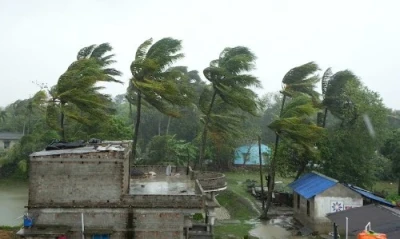This year’s first major cyclonic storm, Cyclone Remal, has wreaked havoc across Bharat and Bangladesh, claiming the lives of 16 individuals and causing extensive power disruptions, according to Reuters.
With wind speeds reaching up to 135 kph, the cyclone made landfall near the Bay of Bengal coast late Sunday, impacting areas around Bangladesh’s southern port of Mongla and West Bengal’s Sagar Islands around 9 pm local time.
In Bangladesh, 10 fatalities were reported, while the remaining casualties occurred in West Bengal. Tragically, some victims lost their lives en route to relief shelters, while others succumbed to drowning or collapsed homes amid heavy waterlogging and storms.
West Bengal bore the brunt of power-related fatalities, with four individuals electrocuted, bringing the State’s death toll to six. The cyclone also inflicted significant damage to power infrastructure, leaving nearly three million people in Bangladesh and thousands in West Bengal without electricity.
In West Bengal alone, approximately 1,200 power poles were uprooted, and 300 mud huts were destroyed, exacerbating the region’s woes. Anticipating the storm’s impact, Bangladesh preemptively shut down electricity in certain areas to mitigate accidents. However, fallen trees and snapped power lines further hampered supply in coastal towns.
The deluge caused widespread flooding in Kolkata on May 27, triggering multiple wall collapses and toppling at least 52 trees. Despite the chaos, the city resumed flight operations after cancelling over 50 flights on Sunday. Suburban train services also resumed following disruptions.
In response to the crisis, both Bharat and Bangladesh evacuated over a million people to relief shelters as rising water levels and heavy rains disrupted coastal communities’ daily lives.
Cyclone Remal serves as a stark reminder of the destructive power of nature, leaving behind a trail of devastation and loss in its wake.

















